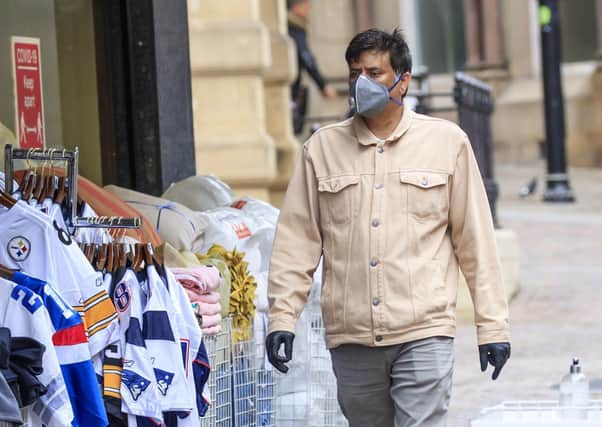We have to better protect health of our BAME communities - Colin Garner


Like the rest of us perhaps, with painful memories of lockdown, families missing each other, momentous events from marriages to graduation ceremonies cancelled, increased anxiety, poor mental health and even the heartache of losing a loved one without being able to present at the funeral?
Unfortunately, resentment might also be an issue within our BAME communities, as they contemplate more misery than most and wonder “what did we do to deserve this?”
Advertisement
Hide AdAdvertisement
Hide AdTo which the answer is “nothing”. You simply found yourselves living in poorer neighbourhoods, working in frontline tasks that could have been shared around and doing low paid work that necessitated you going into work every day, rather than enjoying the safety of furlough.
Plenty of research has proved that the risk of death from Covid-19 is generally higher amongst black, Asian and ethnic minority (BAME) communities than white British people. Among those tragic fatalities have been the NHS workers caring for patients with the virus.
Until a group of Greater Manchester doctors decided to band together and create their own health and safety scorecard, nobody seemed to acknowledge that those from BAME communities were being affected more than anyone else.
And why? Because they were too often being put in harm’s way in emergency care when they could easily have made an effective contribution elsewhere.
Advertisement
Hide AdAdvertisement
Hide AdOf course, culturally those who heal the sick are revered in BAME communities and that issue of heritage and core beliefs has been seen as a reason for increased deaths.
The bigger issue though, is that health communications are not sophisticated enough and are not reaching individuals and communities as well as they might.
Well-meaning local authorities print their leaflets in different languages but, as a study by Antibiotic Research UK of South Asian communities showed, BAME communities receive their messages pretty much like everyone else.
Treating them with respect therefore, understanding the culture, recognising that generations differ, is the key to engagement. Marketeers do this successfully to sell a product to a target audience – why don’t we do this with health?
Advertisement
Hide AdAdvertisement
Hide AdAntibiotic Research UK entered into this research, plus analysis from around the world of infections within BAME groups, because we wanted to find out if minority ethnic groups are more susceptible to not only coronavirus, but to the deadly bacterial infections (or superbugs) we campaign to halt.
Our findings were fascinating and disheartening. Potentially serious superbugs such as MRSA and bacterial infections of the gut including C-Difficile, were sometimes twice as prevalent in BAME communities than white ones.
Everything from the aforementioned ineffective communications to poorer diet, lack of access to healthcare, fewer exercise facilities, poor and overcrowded housing, longer working hours, reduced educational opportunities and less access to quality food contribute to a lower life expectancy for those in more needy neighbourhoods.
And the sad fact is, that is where BAME communities tend to be, in Yorkshire and beyond. So, what is the solution? Without new treatments to replace our ageing antibiotics, how do we protect our BAME communities better?
Advertisement
Hide AdAdvertisement
Hide AdAt this stage, we can but mitigate. Attempt to engage more effectively and get across messages about everything from hygiene to using antibiotics properly and not demanding them from GPs who are more stretched in deprived areas than in affluent ones.
Opening that dialogue teaches you all about cultural differences and how to work with them.
Some of our best doctors are of South Asian descent, the cleaners who keep hospitals free of deadly infections may come from everywhere from Eastern European to Africa as may the nursing staff.
If we are serious about black lives mattering, we have to protect our BAME communities better, from bacterial infections we thought long gone such as TB, to the virulent and destructive virus currently decimating lives.
Advertisement
Hide AdAdvertisement
Hide AdProfessor Colin Garner is the chief executive of Antibiotic Research UK, a York-based charity dedicated to raising awareness of drug-resistant infections and supporting those living with them.
Support The Yorkshire Post and become a subscriber today. Your subscription will help us to continue to bring quality news to the people of Yorkshire. In return, you’ll see fewer ads on site, get free access to our app and receive exclusive members-only offers. Click here to subscribe.